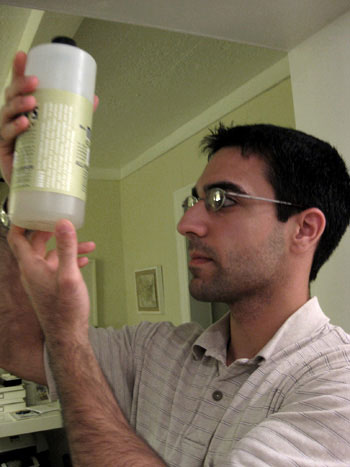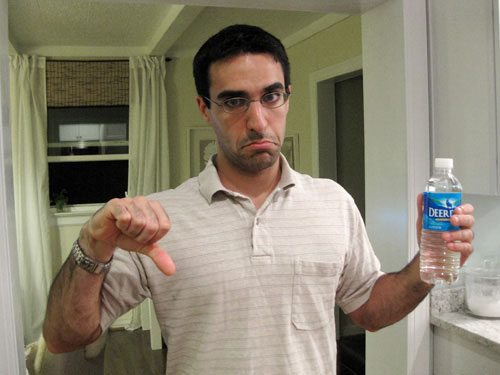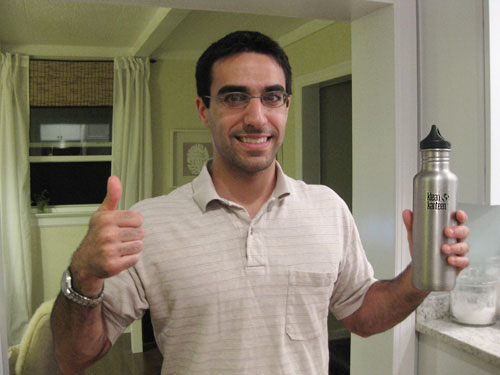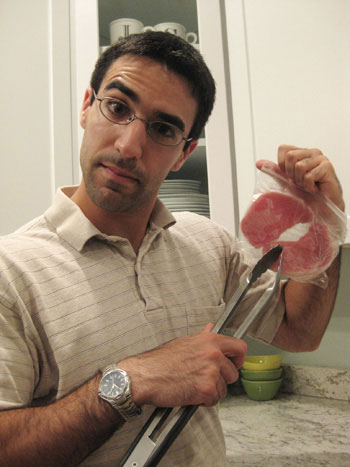Meet my über intelligent little brother* Dan.

Growing up I was always referred to as “the creative one” which was the family’s way of saying “not the prodigy” which was my brother’s territory. It wasn’t that I was dumb, I routinely made the honor roll and even got accepted early admission into a prestigious university art program in NYC (graduating with only 13 others in my major). But Dan was a bit hard to compete with in the brains department. In high school he took nine AP tests and got fives on all of them (I took one and got a 4). Then he got into Cornell and graduated with the highest GPA of his entire graduating class (a 4.21 if you’re wondering). Yup, out of all of the kids in Cornell’s College of Agriculture and Life Sciences, he was the Valedictorian. Yeah, he’s brainy.
Now he’s a graduate student at Columbia with a Master’s degree under his belt, steadily working his way up to his Doctorate in chemistry with a full scholarship from the National Science Foundation. Not only do they pay for his education but they actually pay him a stipend for rent and food- all in return for wearing a lab coat almost 24/7 and messing around with molecules and polymers all day. Sweet deal huh? Serious Einstein stuff going on.
Anyway, so when he recently visited us we got to chatting about… household chemicals (naturally). John and I love to live as purely as possible and stay away from the nasty stuff, so it was really eye opening to “mythbust” with my mad scientist sibling. What’s dangerous? What’s harmless? Here’s his almost-doctor take on the household habits and materials that’ll do you good or do you wrong.
What’s your take on BPA in plastic water bottles and other household plastics? Most evidence points to the fact that these chemicals are to be avoided, if not only for their effect on humans but also for their effect on the environment. It’s easy to use stainless steel or glass drinking containers to avoid BPA and I can’t imagine a time in the next hundred years that any evidence would point to dangers in glass or stainless steel, so those are a much safer bet.
The YHL takeaway: We love using stainless steel bottles like Klean Kanteen (we keep one at home, one at work, and one in the car for sipping without fear).


How about fireproofing chemicals that are used in many standard mattresses and pillows? They’re bad news. These objects that touch our bodies on a regular basis contain chemicals that, as they degrade, become “house dust” which you inhale. These chemicals are later found in your body, and even found in mothers’ breast milk, which is scary when you think about it.
The YHL takeaway: Snagging organic wool or cotton pillows without fireproofing chemicals (now available at Bed Bath & Beyond) is an easy upgrade, and the next time you’re in the market for a new mattress, grabbing something organic and chemical free will help you sleep easy (like our new latex one).
What about soaps and shampoos with sodium lauryl sulfate? Is that a chemical to be avoided as well? It’s hard to find things without that ingredient! I’m 99% sure that it’s a completely harmless ingredient. Sodium lauryl sulfate is essentially the product of your body’s metabolism of vegetable oils or fats, so it’s found in your own body when you digest fats- and because you can ingest quite high levels of it (and actually metabolize it) it stands to reason that there’s no danger to put it on your head or you skin.
The YHL takeaway: It’s nice to hear that not everything is indisputably bad for us, although we love Avalon Organics shampoo & conditioner (which are actually sodium lauryl sulfate free… just in case).
Teflon. Yea or Nay? This is a substance I would avoid if possible just to be safe. If you’re careful enough with your cookware (and never heat it to an extremely high temperature) it’s probably just fine. But the best way to be sure is to simply avoid it. Since the thermal degradation of Teflon and similar polymers would release toxic compounds into the air and your food, people have begun to move away from it, but this only occurs at temperatures that are higher than those required for cooking. If you feel that you really have to use it, avoid preheating your pans for unnecessarily long lengths of time, or using your Teflon pans for high-heat cooking. On a similar note, I would also avoid heating any plastics in the microwave (tupperware, saran wrap, etc) since the thermal degradation of these polymers can also occur, potentially releasing toxins into food. Again, as with teflon, normal cooking temperatures are probably okay, so if you feel you really have to microwave plastics try not to overheat them.
The YHL takeaway: We love our new Teflon-free Greenware pots and pans, made from eco-friendly materials that are chemical free (yet gloriously non-stick thanks to the Ceramica technology). And we swapped all of our tupperware out for glass containers (sold at Crate & Barrel and even Target) for safer microwave usage.

What about barbequeing meat? I’ve heard that it releases dangerous carcinogens into the grub. True? Yes, this method of cooking is probably not the safest. Essentially any act of cooking that chars the meat to the point of blackness is making polyaromatic hydrocarbons (aka PAHs) which are poorly metabolized by the body and may result in DNA damaging chemicals that could be carcinogenic. I haven’t heard concrete evidence linking cancer to burned meat so I can’t be sure, but from a chemistry standpoint those chemicals should be carcinogenic. Science points to avoiding them. One way to potentially avoid releasing these chemicals would be to marinate the meat beforehand, and keep it moist while cooking, since heating dry meat results in more charring.
The YHL takeaway: When you fire up the bbq, don’t forget to marinate your meat. And perhaps consider making it a once a week treat as opposed to an everyday effort.

What about phthalates? We’ve heard that they’re in a slew of products and they might not be best for humans or Mother Earth. Dish! I’ve only heard of these being used as plasticizers in bottles and containers, but in general, like BPAs, they appear very harmful to the environment and possibly harmful to humans as well (I’ve heard of studies in which these chemicals have been known to sterilize and even change the genders of fish and frogs).
The YHL takeaway: Say no thank you to phthalates by selecting a slew of products with a label that boasts that they’re phthalate free (we love companies like Tom’s Of Maine and Dr. Bronners for their dedication to avoiding ’em).
What’s something major that we should all stay away from? Anything that sets off multiple alarms in your mind when you picture people using these materials or products on a daily basis? In general from my random label-reading I would say that the most toxic ingredients you can find are usually in glues. For example the solvent for the glue used in model building is toluene, which is a potential carcinogen. Glues like Superglue also contain volatile organic compounds that are quite toxic until the glue dries, so if you are going to use these products using them in a well ventilated area is very important.
The YHL takeaway: Good to know. From this point on any glue-related craft project will be relegated to the great outdoors where it will remain until thoroughly dry.
Anything else we can glean from Almost-Dr. Dan? I think the vast majority of organic compounds that are dangerous have strong smells, so in general if you smell something that has a chemical odor it’s best to use it sparingly or with adequate ventilation.
The YHL takeaway: Make like Tucan Sam and follow your nose- and switch to something less stinky when you can. And if you’re seriously wondering what cyanocobalamin is, just ask your geeky brother (or mine). It’s a B vitamin by the way.
So there you have it. A slew of straight household-chemical-related answers from my brother, who spends 99% of his waking hours holding a test tube. For more ways to keep your home healthy, check out how we swapped out a few things in our home to live cleaner and greener in a snap. And feel free to pipe up with other ways to clean, bathe, and cook in safe and oh so smart ways!
*Yes, Daniel is my bona fide brother. Same mom and dad. He got the dark, brooding Italian hair and eyes from my mom (with a name like Diana Teresa DeCesare LaPadula she’s totally Italiano) and I got the fair skin and light eyes from my Austrian dad’s side of the family.

Ali says
I guess I didn’t realize my dorky chemistry bf was such a stud – maybe I should go get him a ring. What a nice group of blog-readers – thanks for all the congrats. Great post, Sherry.
-Almost Mrs. Almost Dr. Dan
Seraph says
Ditto MaryB’s thoughts on flame-retardant products–aren’t they flame-retardant for a reason? Is there a way to be flame-retardant without being smothered in harmful chemicals?
And, well, not sure if such a statement is welcome on this blog, but a lot of, um, -adult- toys have lots of pthalates in them, especially those made out of “jellee” materials. Silicone, hard plastic, glass, and steel are safer for one’s um, sensitive parts. Mucus membranes, and all.
YoungHouseLove says
Hey all,
I’ve just called Almost-Doctor Dan and asked him to pop in with some answers for ya. He’s probably busy with his microscope and his lab coat but here’s hoping he finds the time to stop by soon. Stay tuned…
xo,
s
Holly says
As of last Friday he’s engaged?!? Why oh why didn’t you advertise this cutie earlier??? Just kidding (kind of!), thanks for the info. :)
Almost Dr. Dan says
WOW I might be good at chemistry but blogging really isn’t my thing – I just typed out a couple pages of answers and then hit the ‘back’ button by accident. Rats…
But I love my sis so here goes again
(p.s. – thanks to all who liked my post, my engagement, and apparently my looks as well – it’s amazing what photoshop can do these days…)
Nicole et al. – Good points about SLS! From a toxicity standpoint it’s not an issue, but like most emulsifiers it will dissolve the natural oils found in your skin, hair, and scalp. Not a problem for greasy guys like myself but certainly an issue for some.
Kellie – You make an excellent point. If i followed every possible precaution in my chemistry lab I’d get about one experiment done every week (you’d all be surprised to know that it’s illegal to pour out aqueous ethanol solutions in the sinks – think about that next time you’re pouring out a half empty beer or cocktail, or that sand is a known cancer causing agent – but then again you have to grind it up and inhale the dust for decades to be at risk…). There is definitely a balance between radically changing the way you live your life and avoiding some risks that might not be all that risky. We all know people who don’t even wear their seatbelts when they drive, and how hard is that to do? Then again there are those who carry around those antibacterial hand lotions for every time they touch a door handle. I am gonna have to disagree with the statement that our grandparents and parents have been exposed to more harmful chemicals that we have. The vast majority of additives in food, cosmetics, cleaning products, plastics, paint, etc weren’t in existence until the last few decades. The number of patented synthetic organic compounds has exploded in the last 50 years or so.
Jennifer – As far as I know aluminum isn’t any more toxic than stainless steel, and I can’t think of a good reason why it would be harmful at all. No guarantees – but certainly no alarm bells going off for me.
Elizabeth and Erin – Unfortunately I’m not really sure what those are and whether they are harmful or not. Wish I could have been more helpful but it’s just not my specialty!
Meagan – Excellent point. It actually reminds me of something I meant to talk about with Sherry about but forgot! Antibacterial soaps. Hate to break it to you but unless you work in a hospital or doctor’s office there are really no need for these. The whole idea of an ‘antibacterial soap’ is a bit silly – the point of a soap is to allow water to wash away things like bacteria! The antibacterial agents they use (there’s one in particular whose name is evading me but it’s a chlorinated aromatic that doesn’t look particularly biodegradable) aren’t harmful to us, but every time we wash our hands with them they end up in rivers, lakes, oceans, and groundwater. My advice is to avoid these unless you need them for medical work!
Tracie – Sorry but unfortunately I’m not really sure about the toxicity of polymethacrylic acid. I’ll look it up if I get a chance though- sounds fun!
MaryB – Good point. I meant to talk about that with Sherry but forgot. You’re trading an obviously deadly risk for one that might be harmful from a chemical standpoint- not necessarily a winning scenario depending how you look at it. As a ‘green’ alternative I’d suggest wool; it’s naturally flame-resistant (and the mattress John and Sherry got has that in the cover so it’s still flame resistant without being soaked in chemicals).
Seraph – Haha well that actually brings me to another point. The less mainstream you get, the less regulation you’re going to find in things. About a year or so ago a friend of mine showed me this ‘aphrodesiac’ he had picked up at a reputable drug store – I looked up the main ingredient and found out it was acutely toxic and known to cause nerve damage and cancer! And this stuff was being sold over the counter! Any ‘snake oil’ you buy is likely not regulated and possibly toxic. This unfortunately applies to a lot of trendy foods and supplements (Selenium is toxic in large amounts, as are the main ingredients in wheat grass) so try to stay away from these things if you can.
Hope that was helpful, keep up the good work Sher!
YoungHouseLove says
Thanks Almost-Doctor Dan! You’re a wealth in information and quite modest too (photoshop did come into play to adjust the lighting situation, but my brother himself didn’t need any help). We’re so glad everyone was so enthusiastic to virtually meet my bro, and we’ll definitely bring him back for another installment of Almost-Doctor Dan in the future. Stay tuned…
xoxo,
s
madelaine says
Great post!
Always looking for ways to stay healthy and help the environment.
Christine says
Great article! Easy to read and informative! Thank you!
Kellie says
Thanks for the well thought out response, Almost-Doctor Dan. I suppose you’re right. When I said past generations were exposed to more yucky things, I was referring to lead paint, asbestos and stuff like the wacky 50 year-old chemicals I found in the tool shed on my property. A quick Google search told me that many of them have been banned. My boyfriend made the mistake of smelling something in a green glass jug, and it actually burned his nostrils. I wish I could remember what it was.
I guess the lack of chemicals in food and other products back then probably more than made up for the other items, and unless our grandparents were licking the walls, eating paint chips, or picking at pipe insulation, it likely wouldn’t affect them.
My main thing is…living a healthy lifestyle, eating as few processed foods as possible and exercising will make more of a difference in your overall health than going out of your way to avoid chemicals that in most people, generally won’t ever cause problems. Harmful chemicals probably aren’t going away any time soon, so let’s expose ourselves as much as possible so that we as humans can evolve to tolerate them better! Maybe we’ll start glowing. Nanoo nanoo.
Tracie says
Dan,
Thank you for taking time to answer (again after hitting the back button)! Just wanted you to know your time is appreciated and your dedication to your sis. Also, that I came back to read the comments.
Jeannine in Cville says
I hope I’m not too late to add one more question. I’m curious about how a chemist feels about traditional candles. I try to stick to soy-based candles, but I still have some non-soy ones around (mostly gifts). Should I pitch them or is it okay to burn them now and then?
becky says
Wow–great post! I especially love the discussion in the comments…so nice to see reasonable, thoughtful comments on both sides of a very serious issue.
I do agree with Kellie, et al., in that there is NO way one can reduce all harms or risks and still live a life. What I loved about Almost-Doctor-Dan’s post is that he laid out the evidence-based facts. We need more of that, rather than scaremongering headlines that are sometimes based on shaky data. Once we get the facts, we are equipped to make the right decisions for our own lives–a very good thing.
And finally, what really spurred me to post. I’m a microbiologist, so THANK YOU for your comment on antibacterial products. I teach college students, and I try to stay off the soapbox when I lecture, but this issue always gets me ranting a tiny bit.
Katherine says
Fantastic post! I think the last point about things with strong smells was a great way to finish off. It reminded me of the cleaner I used to use for washing our floors – it had a really strong chemical smell, and everytime I used it I would end up with a pounding headache afterwards. I switched to using a mixture of vinegar and water on the floors – it works great, and no more headaches! And the vinegar smell goes away as it dries. It was a similar story with cleaning the bathroom. I’ve started using natural cleaners and they work just as well, and don’t have such a strong chemical smell to them. My favourite brand is method – they smell really good and work well too.
Christin M says
Great post – thanks for the info. We use pots and pans made out of surgical stainless steel with a copper core. They heat up great, they don’t stick, and you can use them on the stove top or in the oven and of course no yucky non-stick stuff peeling up and getting in our food. We also really like the Seventh Generation brand of green cleaning products. We don’t live completely chemically free, butare making adjustments here and there. Thanks to everyone who has posted – great conversation on both sides of the debate of green living.
Christin M says
Becky, if you are still reading this post: is antibacterial soap and cleaner really doing more harm than good? Should I opt for the regular old cleaner (or green cleaners that don’t claim to kill bacteria)? Thanks!
Steph says
Thanks Sherry! I’ll check the link today.
Joye says
What can I do with my toxic cleaners? How do I get rid of them to change out for something healthier for my home?
YoungHouseLove says
Hey Joye,
Check out this post which will hopefully help: https://www.younghouselove.com/2008/10/ten-trades-thatll-detox-your-home/
The comments are also super helpful so be sure to check them out as well!
xo,
s
Jamie says
Thank you! This was a wonderful post. I, too, love that you ended with talking about smell.
I’ve been working on a line of homemade, non-toxic cleaning products for the past year and in talking to people I’ve discovered that smell is very important in cleaning. Most people like the “clean smell” that’s left behind by products like 409 or Febreeze without realizing that sometimes that lingering smell is the most dangerous part. For the people who were testers for me I explained it this way- If you put two bowls out, one filled with vinegar and one filled with a synthetic chemical, and your dog walked over to sniff them you’d see a very different reaction. He’d probably just turn his nose up at the vinegar but he’d instantly recoil from the chemical because those smells are unnatural to our bodies. The only reason we humans sometimes like the “clean smell” is because we’ve grown accustomed to it and we mentally associate those chemical smells with clean. The challenge I’ve given to my friends and family is to switch to non-toxic products for 30 days and then use your old product for a cleaning session. Your nose and body will tell you right away which product you prefer!
Thanks, again, for the informative article.
Johnna says
So I feel terrible contantly posting to your site – I am convinced you’ll think I am a stalker but I have another question:
What do you replace travel coffee mugs with? All of them are plastic! And what is your take on BPA free Nalgene water bottles? Are they as good as stainless?
Thanks for your help!
Johnna
YoungHouseLove says
Hmm, good question Johnna. Here’s a link to some awesome stainless and BPA free travel coffee mugs: http://www.thesoftlanding.com/tea-and-coffee-tumblers.html
I’m sure Almost-Doctor Dan would endorse stainless steel models over the BPA free plastic options just because those may potentially leech other chemicals at high temperatures (which could likely happen with hot coffee). Hope it helps!
xo,
s
Bev says
Sherry, I am coveting those Greenware pieces, but I have SO much cookware already and it wouldn’t be “green” to pitch it all. Anyway, my favorite pots and pans to cook with cast iron (enameled and non-enameled). Cast iron lasts forever, and I am not aware of any health concerns. Also, it’s getting a lot cheaper, even Target has Le Creuset knockoffs that are supposed to be just as good as the original. And because they can be heated to higher temps, they create a great sear on meats.
YoungHouseLove says
Hey Bev,
You’re right about loving cast iron! It’s heralded as very safe in the green world (unlike Teflon) so it sounds like you’ve got some great pots and pans going on already!
xo,
s
Taylor says
After (unsuccessfully) searching all the words I could think of, I decided just to ask (2 years later): What do you use for skin care Sherry? With skin cancer concerns, I’m looking for something natural and to avoid retinyl palmitate and any parabens. I’m guessing you’re as vigilant about skin care as you are about other organic/health/natural issues. Thanks!
YoungHouseLove says
I use Dr. Bronner’s soap in the shower and to wash my face before bed. It’s really mild. I also use Badger sunscreen (it’s ranked really well on EWG’s cosmetics database). And for make-up I use Organic Wear (bronzer, eye shadow, and mascara) which is also really mild so my skin seems to appreciate that. I don’t use any face creams or anything other than sunscreen (they seem to irritate my skin) so just using mild make-up and soap seems to work. Hope it helps!
xo,
s
natalie b says
Hi there guys I love this website! Can I ask you and Almost Doctor Dan what can I safely use to clean the house we have just bought? It is in an appalling state not only visually but it truely assaults the senses as it has been inhabited by a lady with many cats. They have been allowed to use the home as a toilet and it is completely overpowering!
We are in the process of ripping out everything- cupboards, carpets etc and the whole house, walls, cement floors are in urgent need of substantial scrubbing-what can we use to clean and remove the smell of years of cat urine? Your input would be very gratefully recieved! Thanks guys
YoungHouseLove says
So sorry, Almost-Doctor Dan hasn’t studied specific cleaning supplies in detail (and hates to comment on things outside of his expertise). You might want to google “all natural cleaning supplies” since items like vinegar and baking soda/powder are known to remove odors. Hope it helps!
xo,
s
riss says
what about Triclosen in antibacterial soap and Parabens found in 90% of skin care products that studies find it shows up in breast cancer cell samples.
That’s interesting about sodium lauryl sulfate. what about sodium lauryl sulfide? or is it sulfite? I thought that it’s a foaming agent, and what you are washing your hair with, you’re finding it in dish and clothes detergent…which you would think is way too harsh. it’s been feared to cause hair thinning and stripping. right?
YoungHouseLove says
Dr. Dan (that’s right- he’s a Doctor now!) has chatted about triclosan here, so hopefully that helps: https://www.younghouselove.com/2009/10/ask-almost-doctor-dan-handy-or-harmful/
True to form, he hasn’t specifically studied sodium lauryl sulfate so he hates to comment (he thinks that’s like “guessing” and he doesn’t like to discuss anything he hasn’t specifically studied) but there are brands like Avalon Organics and Dr. Bronners that go without it if you just want to be safe. Maybe try googling around or seeing if there are books at the library on that?
xo,
s